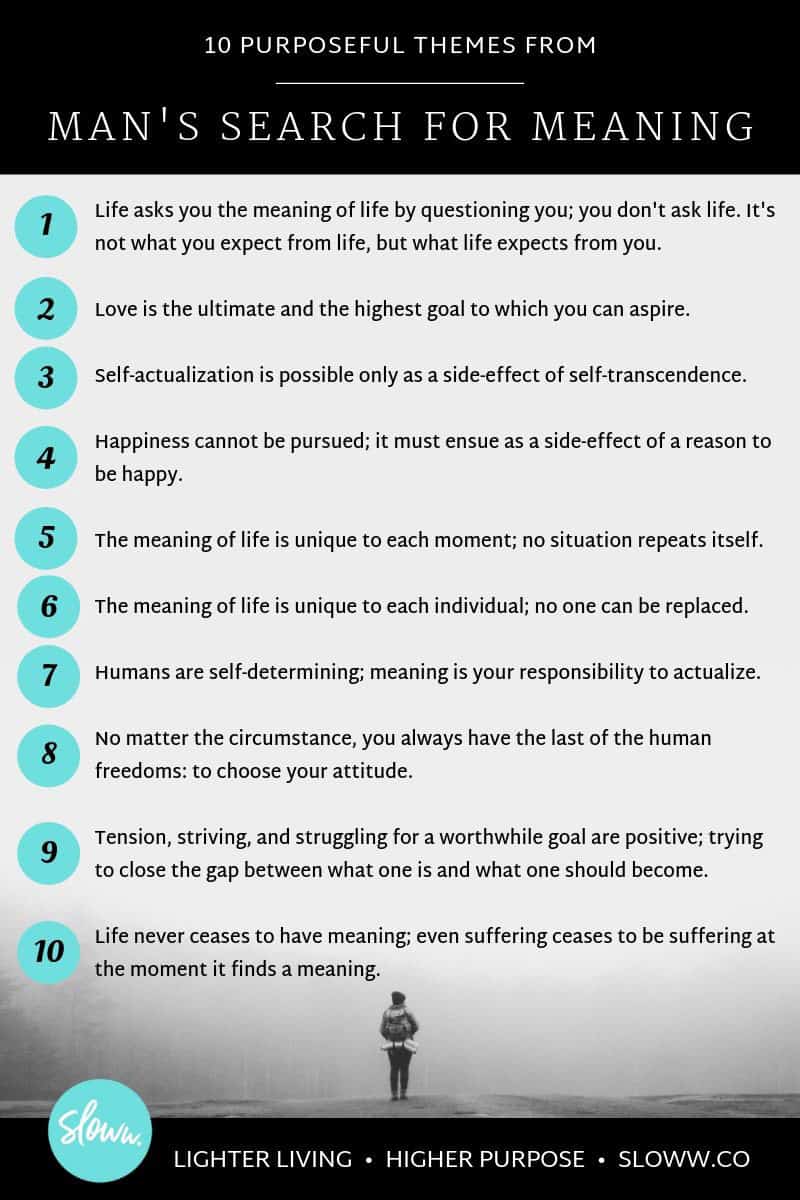If you’re looking for the full book summary, you can find it here: A Deep & Detailed Summary of Man’s Search for Meaning by Viktor Frankl

Who are you when everything is taken away?
- “The majority of prisoners suffered from a kind of inferiority complex. We all had once been or had fancied ourselves to be ‘somebody.’ Now we were treated like complete nonentities. (The consciousness of one’s inner value is anchored in higher, more spiritual things, and cannot be shaken by camp life. But how many free men, let alone prisoners, possess it?) Without consciously thinking about it, the average prisoner felt himself utterly degraded.” — Viktor Frankl
In the concentration camps, a human being was reduced to a number. Viktor Frankl was number 119,104. Upon arrival at his first camp, he estimates that about 90% of his transport was killed in the first few hours.
Yet, he was still able to find meaning.
In the book, Frankl mentions a couple statistical surveys of college students:
- In one survey of 7,948 students at 48 colleges conducted by Johns Hopkins University, 78 percent said their first goal was “finding a purpose and meaning to my life.”
- Another survey showed that 60 percent of Frankl’s American students showed a marked degree of existential vacuum (feeling of total and ultimate meaninglessness, inner emptiness, a void within themselves).
So, everyone wants meaning/purpose, yet few have found it:
- “These are the dry facts, and they may well be the reason why reporters of American newspapers and particularly of American TV stations more often than not start their interviews, after listing these facts, by exclaiming: ‘Dr. Frankl, your book has become a true bestseller—how do you feel about such a success?’ Whereupon I react by reporting that in the first place I do not at all see in the bestseller status of my book an achievement and accomplishment on my part but rather an expression of the misery of our time: if hundreds of thousands of people reach out for a book whose very title promises to deal with the question of a meaning to life, it must be a question that burns under their fingernails.”
Why?
- “As to the causation of the feeling of meaninglessness, one may say, albeit in an oversimplifying vein, that people have enough to live by but nothing to live for; they have the means but no meaning.”
We all have an individual responsibility today:
- “That is the glorious responsibility of such a time, that we know how many difficulties we have to bear, and yet at the same time how many opportunities we hold in our hands! ‘He who has a why to live for can bear almost any how,’ Nietzsche once said. The consciousness of our unprecedented responsibility, which encompasses the future of one’s own life, or that of a family, of a work, of a larger society, or of a people, a state even, of humanity, this true ‘historical’ consciousness of responsibility will allow the man of today to bear the ‘how’ of his difficult life circumstances, to shape them, to surmount them. In our struggle full of duties and responsibility.” (1946 essay)
10 Purposeful Themes from Man’s Search for Meaning by Viktor Frankl

1. Life asks you the meaning of life by questioning you; you don’t ask life. It’s not what you expect from life, but what life expects from you.
2. Love is the ultimate and the highest goal to which you can aspire.
3. Self-actualization is possible only as a side-effect of self-transcendence.
4. Happiness cannot be pursued; it must ensue as a side-effect of a reason to be happy.
5. The meaning of life is unique to each moment; no situation repeats itself.
6. The meaning of life is unique to each individual; no one can be replaced.
7. Humans are self-determining; meaning is your responsibility to actualize.
8. No matter the circumstance, you always have the last of the human freedoms: to choose your attitude.
9. Tension, striving, and struggling for a worthwhile goal are positive; trying to close the gap between what one is and what one should become.
10. Life never ceases to have meaning; even suffering ceases to be suffering at the moment it finds a meaning.

25 Top Quotes from Man’s Search for Meaning by Viktor Frankl
1. “Ultimately, man should not ask what the meaning of his life is, but rather he must recognize that it is he who is asked. In a word, each man is questioned by life; and he can only answer to life by answering for his own life; to life he can only respond by being responsible.”
2. “It did not really matter what we expected from life, but rather what life expected from us. We needed to stop asking about the meaning of life, and instead to think of ourselves as those who were being questioned by life daily and hourly…Life ultimately means taking the responsibility to find the right answer to its problems and to fulfill the tasks which it constantly sets for each individual.”
3. The truth—that love is the ultimate and the highest goal to which man can aspire…The salvation of man is through love and in love.
4. Love goes very far beyond the physical person…It finds its deepest meaning in his spiritual being, his inner self.
5. “‘The self-transcendence of human existence’…being human always points, and is directed, to something, or someone, other than oneself—be it a meaning to fulfill or another human being to encounter. The more one forgets himself—by giving himself to a cause to serve or another person to love—the more human he is and the more he actualizes himself…self-actualization is possible only as a side-effect of self-transcendence.”
6. “Don’t aim at success—the more you aim at it and make it a target, the more you are going to miss it. For success, like happiness, cannot be pursued; it must ensue, and it only does so as the unintended side-effect of one’s dedication to a cause greater than oneself or as the by-product of one’s surrender to a person other than oneself. Happiness must happen, and the same holds for success: you have to let it happen by not caring about it. I want you to listen to what your conscience commands you to do and go on to carry it out to the best of your knowledge. Then you will live to see that in the long run—in the long run, I say!—success will follow you precisely because you had forgotten to think of it.”
7. “Happiness cannot be pursued; it must ensue. One must have a reason to ‘be happy.’ Once the reason is found, however, one becomes happy automatically. As we see, a human being is not one in pursuit of happiness but rather in search of a reason to become happy, last but not least, through actualizing the potential meaning inherent and dormant in a given situation.”
8. “For the meaning of life differs from man to man, from day to day and from hour to hour. What matters, therefore, is not the meaning of life in general but rather the specific meaning of a person’s life at a given moment.”
9. “These tasks, and therefore the meaning of life, differ from man to man, and from moment to moment. Thus it is impossible to define the meaning of life in a general way. Questions about the meaning of life can never be answered by sweeping statements. ‘Life’ does not mean something vague, but something very real and concrete, just as life’s tasks are also very real and concrete. They form man’s destiny, which is different and unique for each individual. No man and no destiny can be compared with any other man or any other destiny. No situation repeats itself, and each situation calls for a different response. Sometimes the situation in which a man finds himself may require him to shape his own fate by action. At other times it is more advantageous for him to make use of an opportunity for contemplation and to realize assets in this way. Sometimes man may be required simply to accept fate, to bear his cross. Every situation is distinguished by its uniqueness, and there is always only one right answer to the problem posed by the situation at hand.”
10. “Thus far we have shown that the meaning of life always changes, but that it never ceases to be. According to logotherapy, we can discover this meaning in life in three different ways: (1) by creating a work or doing a deed; (2) by experiencing something or encountering someone; and (3) by the attitude we take toward unavoidable suffering.”
11. “Man’s search for meaning is the primary motivation in his life and not a ‘secondary rationalization’ of instinctual drives. This meaning is unique and specific in that it must and can be fulfilled by him alone; only then does it achieve a significance which will satisfy his own will to meaning.”
12. “One should not search for an abstract meaning of life. Everyone has his own specific vocation or mission in life to carry out a concrete assignment which demands fulfillment. Therein he cannot be replaced, nor can his life be repeated. Thus, everyone’s task is as unique as is his specific opportunity to implement it.”
13. “This uniqueness and singleness which distinguishes each individual and gives a meaning to his existence has a bearing on creative work as much as it does on human love. When the impossibility of replacing a person is realized, it allows the responsibility which a man has for his existence and its continuance to appear in all its magnitude. A man who becomes conscious of the responsibility he bears toward a human being who affectionately waits for him, or to an unfinished work, will never be able to throw away his life. He knows the ‘why’ for his existence, and will be able to bear almost any ‘how.'”
14. “A human being is not one thing among others; things determine each other, but man is ultimately self-determining. What he becomes—within the limits of endowment and environment—he has made out of himself…Man has both potentialities within himself; which one is actualized depends on decisions but not on conditions.”
15. “Man is not fully conditioned and determined but rather determines himself whether he gives in to conditions or stands up to them. In other words, man is ultimately self-determining. Man does not simply exist but always decides what his existence will be, what he will become in the next moment. By the same token, every human being has the freedom to change at any instant.”
16. “This emphasis on responsibleness is reflected in the categorical imperative of logotherapy, which is: ‘Live as if you were living already for the second time and as if you had acted the first time as wrongly as you are about to act now!’ It seems to me that there is nothing which would stimulate a man’s sense of responsibleness more than this maxim, which invites him to imagine first that the present is past and, second, that the past may yet be changed and amended. Such a precept confronts him with life’s finiteness as well as the finality of what he makes out of both his life and himself.”
17. “Freedom, however, is not the last word. Freedom is only part of the story and half of the truth. Freedom is but the negative aspect of the whole phenomenon whose positive aspect is responsibleness. In fact, freedom is in danger of degenerating into mere arbitrariness unless it is lived in terms of responsibleness. That is why I recommend that the Statue of Liberty on the East Coast be supplemented by a Statue of Responsibility on the West Coast.”
18. “What then is man? Thus we ask the question again. He is a being that always decides what it is. A being that has within it at one and the same time the possibility of sinking to the level of an animal or of soaring to a life of near-holiness. Man is that being which invented the gas chambers; but he is at the same time that being which walked with head held high into these very same gas chambers, the Lord’s Prayer or the Jewish prayer for the dead on his lips.”
19. “Everything can be taken from a man but one thing: the last of the human freedoms—to choose one’s attitude in any given set of circumstances, to choose one’s own way.”
20. “To be sure, a human being is a finite thing, and his freedom is restricted. It is not freedom from conditions, but it is freedom to take a stand toward the conditions.”
21. “Thus it can be seen that mental health is based on a certain degree of tension, the tension between what one has already achieved and what one still ought to accomplish, or the gap between what one is and what one should become. Such a tension is inherent in the human being and therefore is indispensable to mental well-being. We should not, then, be hesitant about challenging man with a potential meaning for him to fulfill. It is only thus that we evoke his will to meaning from its state of latency. I consider it a dangerous misconception of mental hygiene to assume that what man needs in the first place is equilibrium or, as it is called in biology, ‘homeostasis,’ i.e., a tensionless state. What man actually needs is not a tensionless state but rather the striving and struggling for a worthwhile goal, a freely chosen task. What he needs is not the discharge of tension at any cost but the call of a potential meaning waiting to be fulfilled by him. What man needs is not homeostasis but what I call ‘noö-dynamics,’ i.e., the existential dynamics in a polar field of tension where one pole is represented by a meaning that is to be fulfilled and the other pole by the man who has to fulfill it.”
22. “Human life, under any circumstances, never ceases to have a meaning, and that this infinite meaning of life includes suffering and dying, privation and death.”
23. “In some way, suffering ceases to be suffering at the moment it finds a meaning, such as the meaning of a sacrifice.”
24. “When a man finds that it is his destiny to suffer, he will have to accept his suffering as his task; his single and unique task. He will have to acknowledge the fact that even in suffering he is unique and alone in the universe. No one can relieve him of his suffering or suffer in his place. His unique opportunity lies in the way in which he bears his burden.”
25. “One may only demand heroism of one person, and that person is oneself.”
5 More Bonus Quotes:
Logos is deeper than logic.” (logos = meaning)
“I can say in all good conscience, that I realized the opportunities that presented themselves to me, I mean to say: that I turned them into reality.”
“Nothing can be undone, and nothing can be done away with. I should say having been is the surest kind of being.”
“So, let us be alert—alert in a twofold sense: Since Auschwitz we know what man is capable of. And since Hiroshima we know what is at stake.”
“Our generation is realistic, for we have come to know man as he really is. After all, man is that being who invented the gas chambers of Auschwitz; however, he is also that being who entered those gas chambers upright, with the Lord’s Prayer or the Shema Yisrael on his lips.”
Continue Reading:
Companion post for Premium Members: 🔒 How to Find Meaning in Life with “Man’s Search for Meaning” by Viktor Frankl (+ 2 Infographics)
Full Book Summary of Man’s Search for Meaning





